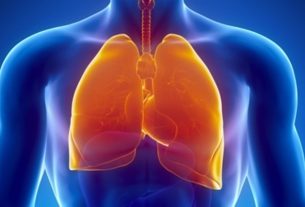Ghrelin is a hormone produced mainly by the stomach and is responsible for stimulating appetite, promoting the release of growth hormone (GH) and stimulating natural bowel movements.
Ghrelin may be increased during fasting or in situations such as cachexia or anorexia nervosa, a disorder characterized by an intense fear of gaining weight, leading to behaviors such as avoiding eating and exercising excessively, for example. Find out more about anorexia nervosa.
Ghrelin levels, popularly known as the “hunger hormone”, are low in the blood immediately after meals, but can also be reduced in cases of people with obesity or who have had bariatric surgery, for example.

Main functions of ghrelin
The main functions of ghrelin are:
- Stimulate the appetite, increasing food intake;
- Increase body fat, as it increases fat storage and decreases the use and breakdown of fat;
- Act on the release of GH, a hormone responsible for growth and which favors the formation of muscles.
- Stimulate natural bowel movements, helping to prevent constipation;
- Facilitate the release of gastric acids, improving digestion;
- Inhibit insulin release, increasing blood glucose levels.
By stimulating hunger, preventing protein breakdown and weight loss, ghrelin has also been studied as a treatment option for high weight loss, such as in cases of cancer and loss of muscle mass, common in the elderly.
Normal ghrelin values
Ghrelin values vary according to the time of the exam and whether or not there was weight loss, as shown in the following table:
In people with normal weight, the average ghrelin value is 520 to 700 pg/mL.
Furthermore, adults who have had bariatric surgery have, on average, blood ghrelin levels of up to 120 pg/mL.
Ghrelin values are assessed through a blood test, which can be requested by a doctor or nutritionist and, for this, you must fast for 10 to 12 hours.
When ghrelin may be high
Ghrelin levels are generally increased during fasting, when the body produces more of this hormone, stimulating hunger. Therefore, it is normal for ghrelin levels to increase before meals.
Ghrelin levels can also be high in situations such as Prader-Willi syndrome or in cases of malnutrition such as anorexia or cachexia. This happens as a defense mechanism of the body to stimulate food intake and weight gain.
What does low ghrelin mean?
Ghrelin levels are naturally lower in the blood immediately after meals.
Furthermore, people with obesity also have low levels of ghrelin in their blood. It is believed that this happens because high food intake causes the body to become sensitive to the action of ghrelin, reducing the production of this hormone as you gain weight.
Relationship between ghrelin and leptin
Ghrelin and leptin are two hormones with different effects, which inform the brain about nutritional needs, being important for the balance between hunger and satiety, allowing weight maintenance.
While ghrelin increases the feeling of hunger, leptin promotes satiety, causing you to stop eating. This means that when leptin levels increase, ghrelin levels decrease. Understand better about leptin.
How to control ghrelin
Some tips for controlling ghrelin are:
- Maintain a healthy diet, including foods rich in fiber and lean proteins, such as fruits, vegetables, whole grains and white meats;
- Maintain adequate weightavoiding constant weight gain and loss, that is, the “yo-yo effect”;
- Avoid excessive consumption of fats, such as fatty cheeses (dish cheese, mozzarella, etc.), whole milk and yogurts, beef, margarine, ice cream, French fries and pizza;
- Eat regular meals, avoiding prolonged fasting and, consequently, the increase in ghrelin;
- Practice physical exercise regularly, such as running, dancing, weight training and swimming;
- Avoid foods rich in sugar, such as glucose syrup, sugar, fruit juice, soft drinks, milk chocolate, candied and candied fruits, industrialized biscuits and industrialized sauces.
Furthermore, to control ghrelin, it is also recommended to sleep 7 to 9 hours a night. This is because getting little sleep can increase ghrelin levels in the body. Here are some tips for sleeping well.
Bibliography
- CLEVELAND CLINIC. Body systems and organs: Ghrelin. Disponível em: <https://my.clevelandclinic.org/health/body/22804-ghrelin#function>. Acesso em 22 ago 2023
- TREASURE ISLAND (FL): STATPEARLS PUBLISHING. Physiology, Leptin. Available at: <https://www.ncbi.nlm.nih.gov/books/NBK537038/>. Accessed on Aug 22, 2023
- TREASURE ISLAND (FL): STATPEARLS PUBLISHING. Biochemistry, Ghrelin. Available at: <https://www.ncbi.nlm.nih.gov/books/NBK547692/#article-33972.s5>. Accessed on Aug 22, 2023
- MAYO CLINIC LABORATORIES. Ghrelin total Plasma . Available at: <https://www.mayocliniclabs.com/test-catalog/Clinical+and+Interpretive/57902>. Accessed on April 23, 2021

Sign up for our newsletter and stay up to date with exclusive news
that can transform your routine!
Warning: Undefined array key "title" in /home/storelat/public_html/wp-content/plugins/link-whisper-premium/templates/frontend/related-posts.php on line 12
Warning: Undefined array key "title_tag" in /home/storelat/public_html/wp-content/plugins/link-whisper-premium/templates/frontend/related-posts.php on line 13



